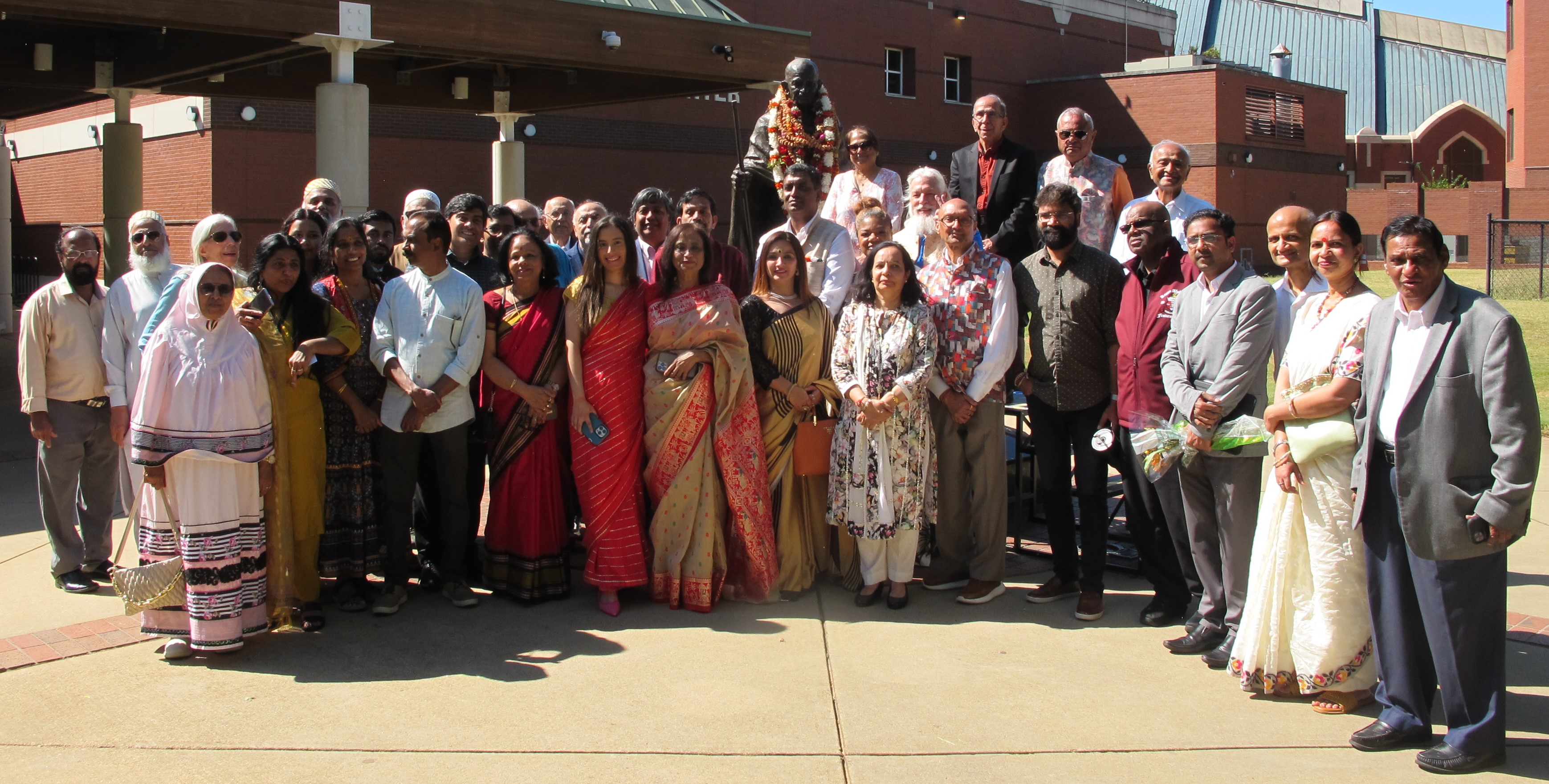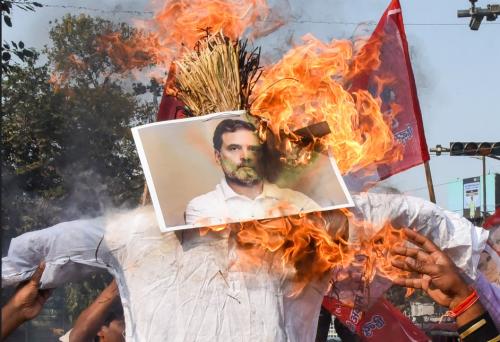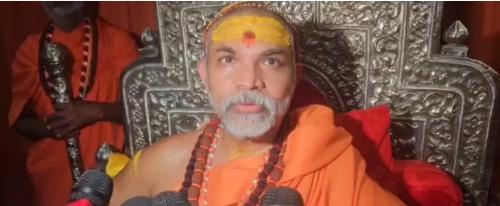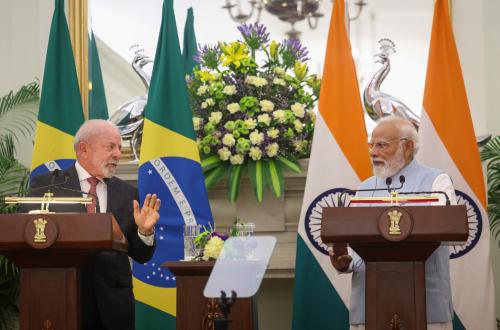By Ravi R. Ponangi
Atlanta, GA: On October 2, the Atlanta community came together for a moving tribute to the legacies of Mahatma Gandhi and Lal Bahadur Shastri, India’s second Prime Minister, marking the United Nations–designated International Day of Non-Violence. The event took place at the iconic Mahatma Gandhi statue at the Martin Luther King Jr. National Historic Site — a deeply symbolic setting that reflects the shared ideals of peace, justice, and non-violence between two towering figures of the 20th century: Gandhi and Dr. King.
Organized by the Gandhi Foundation USA (GFUSA) in collaboration with the Consulate General of India in Atlanta, the ceremony drew a diverse gathering of community members, civic leaders, and consular officials. Attendees offered floral tributes at the statue, honoring Gandhi’s 156th birth anniversary and celebrating his enduring commitment to truth, peace, and service. The day also marked the 121st birth anniversary of Lal Bahadur Shastri, remembered for his humility, integrity, and call for national unity through his slogan “Jai Jawan Jai Kisan.”
The program began with the garlanding of the Gandhi statue by Consul General of India in Atlanta, Ramesh Babu Lakshmanan, along with other dignitaries. The atmosphere was solemn yet uplifting as the gathering reflected on Gandhi’s philosophy of Ahimsa (non-violence) and Satyagraha (truth-force), and Shastri’s values of simplicity and moral strength. Speakers emphasized the relevance of their principles in addressing today’s global crises—ranging from conflict and inequality to environmental degradation.
GFUSA Chairman Subash Razdan opened the ceremony by recounting the history behind the establishment of the Gandhi statue in Atlanta. He noted that the statue was installed in 1998 after years of effort and collaboration, with invaluable support from Mayor Maynard Jackson and the King family. The Gandhi Room, functioning as a museum, had earlier been set up in Freedom Hall in 1987. “The statue stands at the entrance of the park as a symbol of friendship, fraternity, and homage,” Razdan said, adding that it attracts over a million visitors each year. The bronze statue was sculpted by renowned Indian artist Ram Sutar and donated by the Indian Council for Cultural Relations (ICCR) and the Embassy of India.
In his remarks, Consul General Ramesh Babu highlighted the profound connection between Mahatma Gandhi and Dr. Martin Luther King Jr., noting that this statue is the only one of Gandhi located on federal property in the United States. He emphasized Gandhi’s pivotal role in India’s independence movement and his global influence in inspiring non-violent resistance around the world. “Even today, as the world faces growing divisions and conflicts, Gandhi’s message remains as vital as ever,” Babu said.
Several community leaders and scholars shared reflections on Gandhi’s timeless teachings and their continuing impact. Gregory A. McPherson, the newly appointed Choir Director at Delaware State University, announced plans for a symphony dedicated to Mahatma Gandhi — a creative endeavor to celebrate his ideals through music, the universal language of harmony. Dilip Mehra, representing the Heartfulness organization, urged the audience to internalize Gandhi’s teachings rather than limit them to annual observances. “Let us practice what Gandhi lived for — daily prayers for universal love, brotherhood, and peace,” he said.
GFUSA member Viren Mayani eloquently reminded attendees that the foundation’s work is deeply rooted in both American and Indian ideals of freedom and justice. “GFUSA follows in the footsteps of two great apostles of peace — Mahatma Gandhi and Dr. Martin Luther King Jr.,” Mayani said. He expressed gratitude to Coretta Scott King for ensuring Gandhi’s legacy was honored with a dedicated room at The King Center. “Today, the Gandhi statue stands here as a symbol of unity and shared values between two nations. These commemorations are not just rituals; they are reminders to keep their flame alive, to uphold the values of peace, justice, and equality they stood for,” he said. “Let us continue celebrating their legacy and ensure that future generations understand the price of freedom and the power of nonviolence.”
The ceremony concluded on a soulful note with renditions of two of Gandhi’s favorite bhajans — “Vaishnav Jan To Tene Re Kahiye” and “Raghupati Raghav Raja Ram” — performed by composer Tejas Chavan. The event closed with the cutting of a traditional birthday cake by Consul General Babu and several guests who share a birthday with the Mahatma. The gathering resonated with a sense of unity and inspiration as attendees reflected on Gandhi’s enduring legacy and the timeless relevance of his teachings.
The day’s events were not limited to the King Center ceremony. Earlier that morning, the Indian Consulate in Atlanta, led by Consul General Ramesh Babu, hosted a special commemoration at the Gandhi bust located on consulate grounds, where officials and staff paid rich floral tributes to the Mahatma.
The Atlanta observance underscored the city’s longstanding commitment to peace and intercultural harmony. The choice of venue — the Martin Luther King Jr. National Historic Site — carried special meaning, symbolizing the spiritual bridge between Gandhi’s movement for India’s freedom and Dr. King’s leadership in America’s civil rights struggle. Both men, through moral courage and non-violent resistance, transformed the course of history, proving that justice and compassion can prevail without aggression.
The gathering reflected not only the strength of the Indian diaspora but also the universal resonance of Gandhi’s philosophy. Attendees came from diverse backgrounds, united in their belief that Gandhi’s principles are not confined to history but serve as practical guidance for today’s world. In an age marked by war, polarization, and ecological crises, Gandhi’s message of Ahimsa and truth offers a blueprint for healing and coexistence.
While Gandhi Jayanti is a national holiday in India, its observance across the world — including in Atlanta — demonstrates how deeply his philosophy transcends borders. The United Nations’ declaration of October 2 as the International Day of Non-Violence in 2007 reaffirmed his teachings as a moral compass for humanity. Each year, countries around the globe mark the occasion with educational programs, peace marches, and interfaith dialogues, inviting reflection on how non-violence can serve as a tool for resolving modern conflicts.
The Atlanta celebration also paid tribute to Lal Bahadur Shastri, remembered for his integrity, humility, and leadership during a pivotal time in India’s history. Shastri’s slogan, “Jai Jawan Jai Kisan” (“Hail the Soldier, Hail the Farmer”), continues to resonate as a call for balance between defense and development — a vision that remains deeply relevant in today’s interconnected world.
Ultimately, the October 2 commemoration in Atlanta was far more than a ceremonial observance. It was a reaffirmation of how Gandhi’s principles continue to inspire individuals and communities worldwide. His legacy lives on through countless social movements, educational initiatives, and creative expressions — from music and art to activism and public service.
The Gandhi Foundation USA (GFUSA), which organized the event, continues to uphold this legacy through education, dialogue, and community engagement. Its mission is to spread the principles of non-violence, truth, and peace, encouraging people across the United States and beyond to apply Gandhi’s teachings to contemporary challenges. By fostering mutual understanding and cultural exchange, GFUSA helps ensure that Gandhi’s message — and the ideals he shared with Dr. King — remain alive for generations to come.
As the sun set over the King Center that evening, the gentle strains of Gandhi’s favorite hymns lingered in the air, echoing a message as old as time and as urgent as ever: peace begins with each of us.












